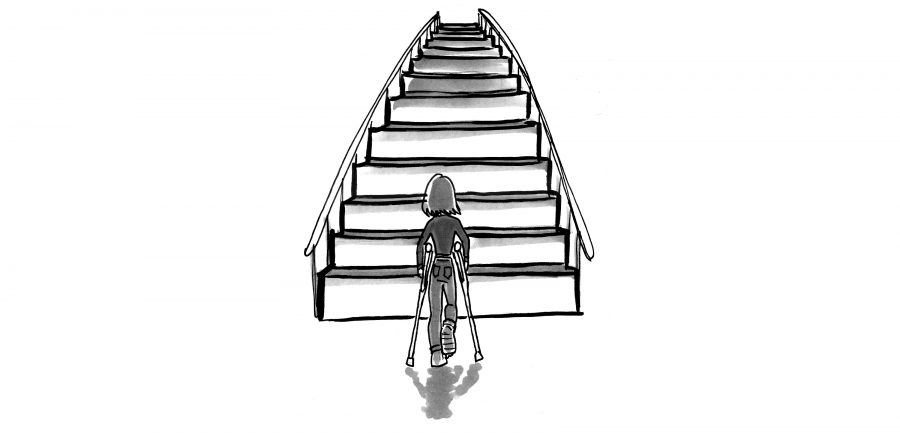Most people take the choice between climbing stairs or taking the elevator for granted, but many differently abled people experience no such luxury. For them, elevators are a necessity.
In 2015, a Pew Research Center study found that the most common disabilities among Americans involve difficulties with walking or independent living, and 7.1 percent of the U.S. civilian noninstitutionalized population — 20 million people — report having serious difficulty walking or climbing stairs.
UT prides itself as an inclusive campus that accommodates all students, yet people with physical disabilities still struggle to get to class. In staying true to its message of inclusivity UT must make elevators more accessible to individuals with temporary and permanent disabilities.
Students with physical disabilities use elevators to get to their classes, dorm rooms and various events around campus. However, poor building design, overcrowding between classes and unexpected elevator maintenance can render elevators across the 40 Acres inaccessible.
Archer Hadley, a government junior and founder of the wheelchair-awareness campaign, Archer’s Challenge, uses a wheelchair every day. Hadley said he appreciates the existence of building ramps, but taking the time to find them has made him late to class on multiple occasions.
“One time when I came to Waggener Hall, the elevator didn’t work,” Hadley said. “I completely missed class because I couldn’t get up to the room.”
Tess Mayfield, a Plan II and math freshman, said she also struggles to reach class when elevators are out of service. Mayfield has had to ride a scooter to class since the first day of school because of her broken leg.
“Elevators will randomly be shut down without notice,” Mayfield said. “I was really late to class because the elevator was stopped, so notifications two days ahead would be great so I can plan.”
Aerospace engineering freshman Manuel Arteaga, who uses crutches and a cast for his leg, also faces difficulties accessing elevators.
“Waggener Hall elevators are always full and really slow, and usually people who don’t need elevators get in first,” Arteaga said. “If I don’t leave twenty minutes before, I’ll be late to class.”
UT has a problem with elevator accessibility. Students with physical disabilities should not have to be late to or miss class simply because of these issues.
When elevators shut down, people with physical disabilities lose access to their classes. They miss out on valuable instruction because of a mechanical problem. Advanced notifications would enable them to better plan for class or speak ahead of time with their professor.
Hadley, who is a permanent wheelchair user and relies on elevators to get to class said he would greatly benefit from prior notice.
“That (elevator notifications) would help me so much,” Hadley said.
If people had a visual cue, of priority designation, students might be more courteous to students who are unable to climb stairs. In addition, opt-in campus-wide email notifications for elevators out of service would help people with disabilities.
When questioned about elevator inconveniences, UT Services for Students with Disabilities assistant director Emily Shryock stated in an email, “There are no special elevators for students with disabilities; students can use any of the elevators on campus just like everyone else.”
Nevertheless, students who use elevators agree that the current system is problematic and could be improved upon. UT should make elevators more accessible by designating priority to people with disabilities and notifying students prior to elevator shut-downs so students can better prepare.
It’s not a question of preference, but of necessity. We must remember the seven percent who do not freely choose the elevator — but need it.
Mathavan is a business honors freshman from McAllen.





















